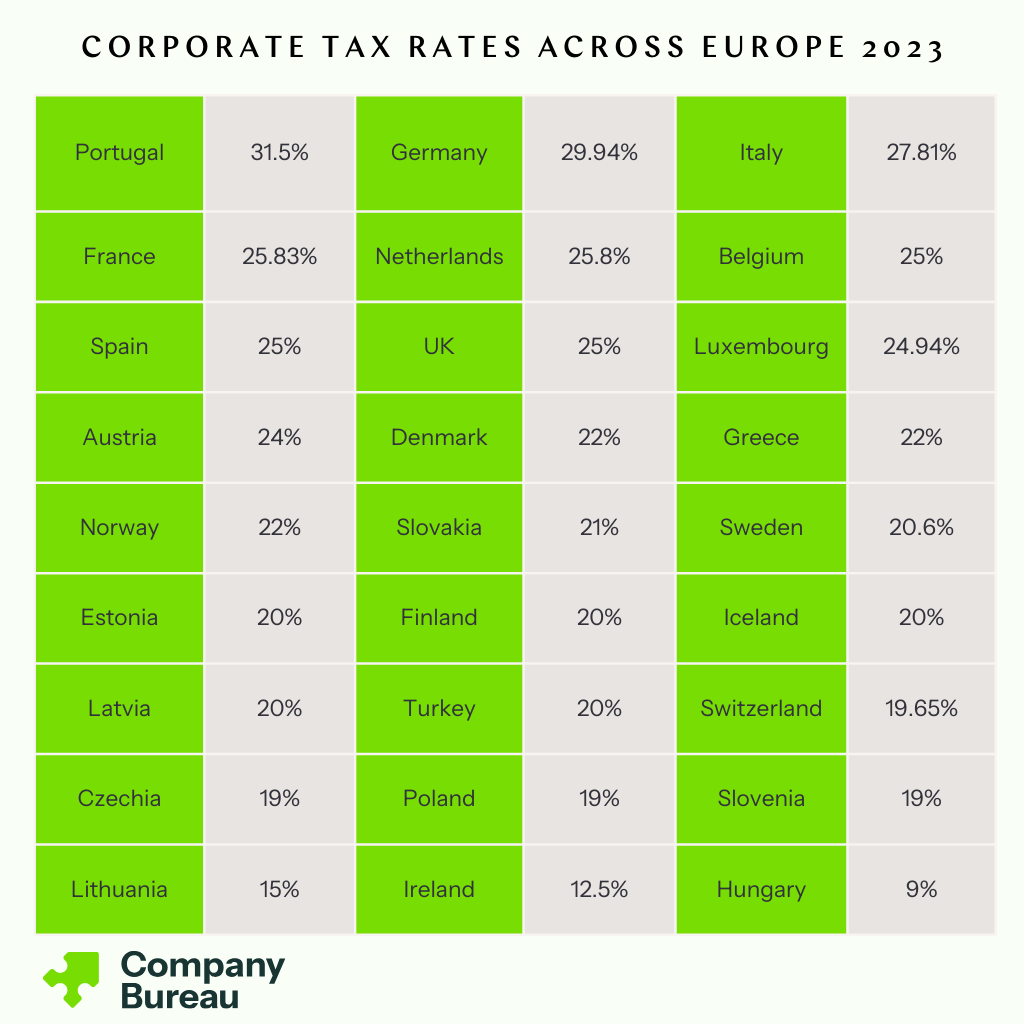
By Shannon Power, 28th November 2023
Corporate tax rates play a pivotal role in shaping a country’s economic landscape and attracting foreign investment. In Europe, the diversity in tax policies has created a spectrum of opportunities and challenges for businesses. Among the nations that stand out, Ireland has gained widespread attention for its favourable corporate tax rates, making it an attractive destination for multinational companies.
Understanding Corporate Tax in Europe:
The European continent is a mosaic of nations, each with its own economic structure, fiscal policies, and corporate tax rates. Understanding the diverse tax landscape is essential for businesses aiming to establish a foothold in Europe. Here, we delve into the variations in corporate tax rates across different European countries and explore how these differences impact multinational enterprises.
-
Nordic Countries: Countries like Sweden, Denmark, and Finland are known for their robust social welfare systems. Consequently, they often have higher corporate tax rates, ranging from 20% to 22%. However, these nations boast stable economies, well-educated workforces, and a high quality of life, making them attractive for certain industries.
-
Western Europe: In countries such as Germany and France, corporate tax rates tend to be in the mid-20s. These nations often justify higher rates by pointing to their substantial public services and infrastructure investments. However, efforts to reduce these rates to enhance competitiveness are not uncommon.
-
Southern Europe: Countries like Italy, Spain, and Greece have faced economic challenges in recent years, prompting them to re-evaluate their tax policies. Corporate tax rates in these countries typically hover around 24% to 28%, as they aim to strike a balance between revenue generation and attracting foreign investment.
-
Eastern Europe: Post-communist countries in Eastern Europe, including Poland, Hungary, and the Czech Republic, have been actively working to attract foreign direct investment. As a result, these nations often offer more favourable corporate tax rates, ranging from 9% to 19%, to stimulate economic growth and job creation.
-
United Kingdom: The UK’s corporate tax landscape has seen changes in recent years. The standard rate is around 19%, and the government has indicated a desire to maintain a competitive tax environment post-Brexit. The country aims to attract businesses and investment while navigating its new economic relationships.
Ireland’s Corporate Tax Landscape:
Ireland, often referred to as the “Celtic Tiger” due to its rapid economic growth, has become a beacon for foreign businesses seeking a favourable tax environment. One of the key elements of Ireland’s attractiveness is its low corporate tax rate. Ireland’s standard corporate tax rate is 12.5%, significantly lower than the European average.
Benefits of Ireland’s Corporate Tax Rates:
-
Competitive Advantage: Ireland’s low corporate tax rate gives businesses a competitive edge in the global market. Companies can retain more profits, allowing for greater reinvestment, expansion, and innovation.
-
Foreign Direct Investment (FDI): Ireland’s favourable tax policies have played a crucial role in attracting foreign direct investment. Many multinational corporations have established their European headquarters in Ireland, bringing economic growth, job opportunities, and technological advancements.
-
Stability and Predictability: The stability and predictability of Ireland’s tax regime contribute to a business-friendly environment. Companies appreciate the certainty in tax planning, allowing for better long-term strategic decision-making.
-
Research and Development Incentives: Ireland encourages innovation through various incentives, including tax credits for research and development activities. This fosters a culture of technological advancement and helps companies stay at the forefront of their industries.
-
Global Reputation: Ireland’s commitment to maintaining an attractive tax environment has created a positive global reputation. This reputation not only attracts new businesses but also strengthens the existing economic ecosystem.
Challenges and Criticisms:
While Ireland’s low corporate tax rates have been a boon for its economy, they have also faced criticism, particularly from other European countries and international organisations. Critics argue that such low rates can create tax competition and result in revenue loss for other nations.
The corporate tax landscape across Europe is diverse, offering a range of opportunities for businesses. Ireland’s low corporate tax rates have positioned it as a favourable destination for foreign investment, leading to economic growth and job creation. While criticisms exist, Ireland’s commitment to maintaining a business-friendly environment continues to make it an attractive hub for companies seeking a competitive edge in the global market.
If you have any further questions surrounding Corporation Tax in Ireland or across Europe, please do not hesitate to contact the Company Bureau team. Give us a call at +353(0)1 6461625 or fill out our online contact form.
Disclaimer This article is for guidance purposes only. It does not constitute legal or professional advice. No liability is accepted by Company Bureau for any action taken or not taken in reliance on the information set out in this article. Professional or legal advice should be obtained before taking or refraining from any action as a result of this article. Any and all information is subject to change.
